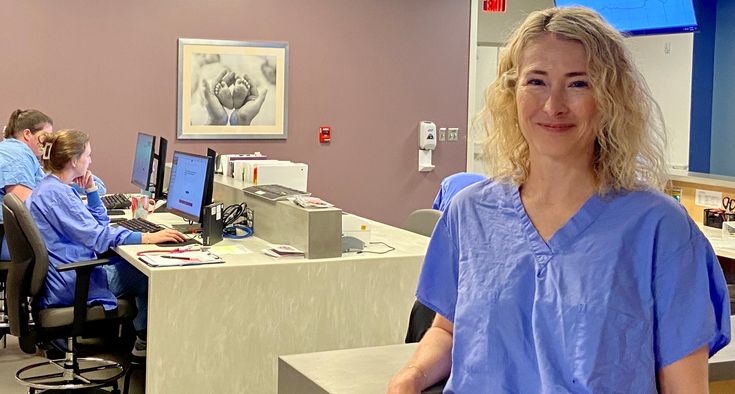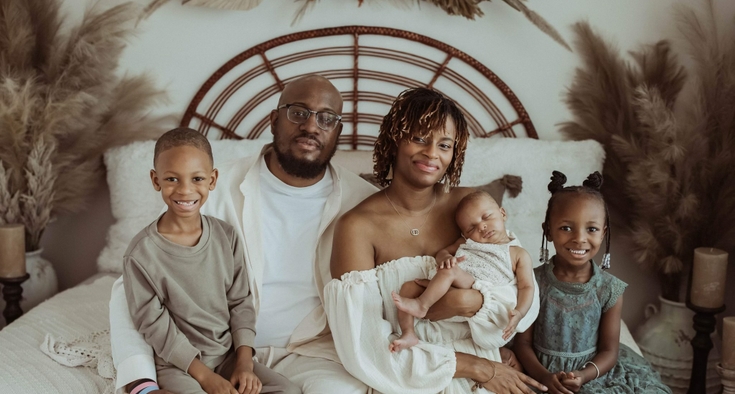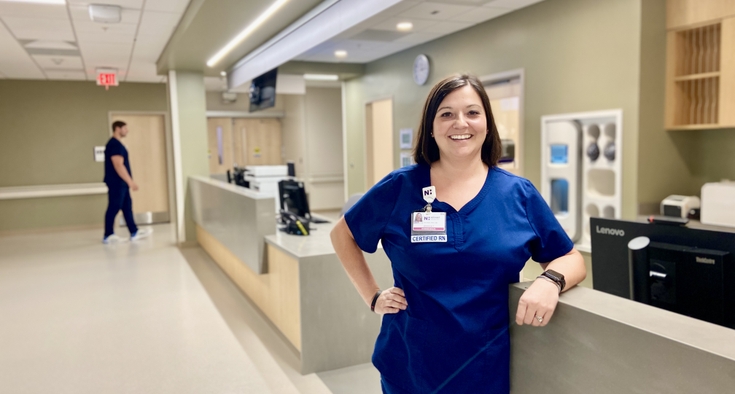Shakeria Clark’s parents died within a year each other – her father in July 2020 and her mother the following April. A beloved uncle died around the same time.
The 29-year-old from Rural Hall, North Carolina, was still reeling from those losses when she found out she was expecting. The single mom already had a 5-year-old daughter, and she felt isolated without her parents to support her. “It’s just my grandmother and me left,” she said.
She considered abortion. In fact, she went to an abortion clinic – but not because she didn’t want her baby. She worried she wouldn’t be able to take care of him. From the clinic, she called her grandmother, who assured her: You’re not alone. Clark left the clinic and headed home.
In the days that followed, Clark kept hearing her mother’s voice in her head, saying, “You’ve got this.”
Soon after Clark went to her OB-GYN at Novant Health Today’s Woman in Winston-Salem, she got a call from Samantha Sharp, a high-risk pregnancy navigator, and nurse, devoted primarily to the Winston-Salem region. She’s one of three systemwide high-risk pregnancy navigators who aim to improve maternal and infant health outcomes for their patients.
Holistic care for high-risk pregnancies.
To be classified as “high risk,” a patient must fall into one or more of three categories:
- Food insecure.
- A previous preterm delivery of less than 34 weeks.
- Substance misuse.
Clark had indicated she was food insecure when she was at her first OB-GYN appointment after finding out she was pregnant. “I wouldn’t have mentioned my food insecurity if I hadn’t been desperate,” she said. “It can be shameful to admit to certain things. It’s hard to ask for help.”
It’s now standard for Novant Health to ask patients about food insecurity. It’s part of a major initiative to address the social determinants of health that prevent many people of color or other disadvantaged backgrounds from attaining optimal health.
Novant Health is also addressing Black maternal mortality – a topic captured in this New York Times story: Childbirth Is Deadlier for Black Families Even When They’re Rich, Expansive Study Finds. Black women are three times more likely to die from a pregnancy-related cause than white women, the Centers for Disease Control and Prevention (CDC) reports.
Support during pregnancy – and beyond
The program has an automatic referral feature through electronic records software, Sharp said. “Our MDs can make referrals, too – but having the automatic feature helps us ensure that no one falls through the cracks.”
When Sharp sees a referral in her inbox, she makes a phone call. She meets with moms virtually – either by phone or video. That’s much easier for a working mom to fit in her schedule.
“I tell them I'm a maternity navigator and offer my support to them throughout their entire pregnancy and into the postpartum period if they want support; no one is obligated. I’m there to answer questions, help with resources, to make sure they have everything they need for a successful pregnancy, postpartum period and motherhood.”
Her patients often have a variety of critical needs. “I don't give them every resource I think of right away because it can be daunting,” she explained. “And they don’t want to stockpile diapers until right before the baby’s due.”
Clark was thrilled to have the support.
Best doctors. Amazing nurses. Remarkable care.
Sharp took care of the biggest need – steady meals – first. She referred Clark to a nearby food pantry and helped her apply for the WIC program. (That stands for Women, Infants and Children. WIC provides basic nutrition services to eligible pregnant, breastfeeding and postpartum women, infants and children up to age 5.)
During subsequent visits, Sharp guided Clark through lining up transportation services, getting assistance paying for medication and more. “Many people don’t know that Medicaid, depending on their plan, covers a lot,” Sharp said. “It might cover transportation. Most plans offer breast pumps. Some offer meal delivery services and even diaper service.”
Clark doesn’t have to worry about getting to her or her children’s doctors’ appointments. Today's Woman offers transportation. “They’ve been great,” Clark said. “They ask if I need diapers and wipes. They offer help, and I never feel judged.”
Sharp checks in with patients every four weeks or so during their pregnancy. And she’s always on call for them. She checks in again two weeks after they deliver.
“We go over all the newborn things – safe sleep, what and how much they should be eating, all of that,” she said. “It’s the same information their pediatricians would’ve discussed, but it can be hard when you're in the pediatrician’s office and your baby’s screaming. So, I reiterate the most important points.
“A lot of that two-week postpartum checkup is specifically for mom. Moms often put themselves on the back burner. Those first two weeks are usually the hardest to get through emotionally.”
A job loss, on top of everything
Early on with this pregnancy, Clark experienced frequent nausea. She was working in a call center and missing incoming calls because she kept getting sick. She asked her supervisor if there was another job she could do in the interim – just until she got past the sickness. Instead, she lost her job and was faced with dwindling savings.
“That put me in a tough spot,” Clark said. “After losing my job, I lost my food stamps. Then, my car broke down. It felt like things were piling on and piling on, one thing after another. I prayed – but nothing got better. But then I talked to Samantha, and she told me about the resources she has access to – a food pantry, a diaper service. Between her and my grandmother, I started to feel like maybe I could provide for another child.”
Sharp told her about Birthright of Winston-Salem, a nonprofit that “provides nearly everything a new mom needs,” Sharp said. “Hotel rooms for homeless moms, gas money, car seats, Pack ’n Plays, you name it – they can provide it. They’re one of our most treasured resources.”
Clark had been seeing a counselor, but didn’t feel therapy was making a difference. Sharp said, “After the baby came, it was more stressful for Shakeria to go to counseling appointments that weren’t effective.” Sharp helped her find a counselor she did connect with and referred her to Trellis for grief counseling.
Clark got a new job last November – fairly soon after losing her old one. It’s less pay than before, but she can work from home, which is key now that she has an infant to care for. Clark delivered her son, Jahseh, at Novant Health Forsyth Medical Center on Feb. 27. He came so quickly that Clark’s grandmother didn’t have time to make it to the hospital.
‘Made me a better parent’
Sharp is highly qualified to guide expectant and new moms; she worked as a NICU nurse for five years. When she took the high-risk navigator role last September, Clark was one of her first patients. They have daughters about the same age and bonded over that.
Sharp calls Clark a model patient. “Compliance is such an important piece of this,” she said. “I can be an adviser, but I’m not the one putting in the work. Shakeria did everything I suggested. And she’s set herself up for continued success.
“I tell my patients that I’ll be their advocate during their pregnancy – and that I’ll teach them to be their own advocate, to speak up when something’s wrong.”
Sharp was exactly what Clark needed to take on a second pregnancy at such a fraught time. She’s been a guiding force for her – as her late parents continue to be. Clark said her parents are still “her greatest motivators.”
“Samantha has kept me sane,” she added. “She’s so calming and reassuring. She’s taught me ways to deal with feeling overwhelmed. If I feel myself getting upset, I remove myself from the situation. I don’t react right away. That’s made me a better parent.”

The Novant Health Foundation makes navigators possible
Novant Health can offer patients like Shakeria Clark access to navigators, thanks to the Novant Health Foundation and its donors.
The Women’s Council, a group committed to improving the health and wellness of Forsyth County’s women and children, supports Novant Health initiatives through Novant Health Forsyth Medical Center Foundation, one of the health care system’s six regional foundations. The Women’s Council raised $100,000 to fund the high-risk maternity navigator positions. The Duke Endowment is providing partial support, as well.
Last year, in honor of their 15th year anniversary, The Women’s Council gave $15,000 to Today’s Woman OB/GYN Clinic, which is in a high-poverty area. And they’re currently raising funds for a new ultrasound for that clinic.
To learn more, visit SupportNovantHealth.org/Give-Where-You-Live.












